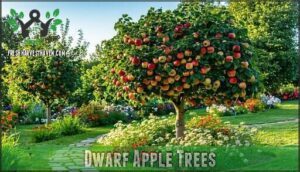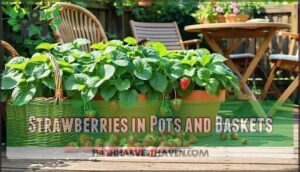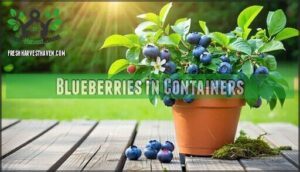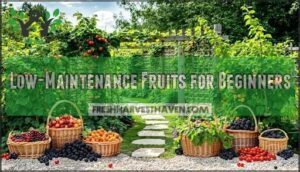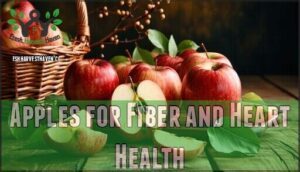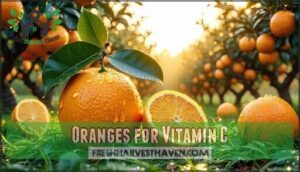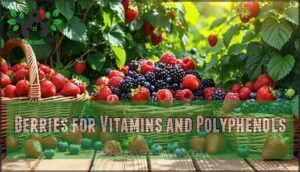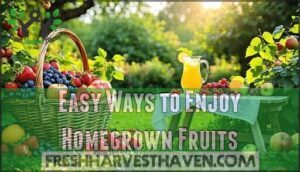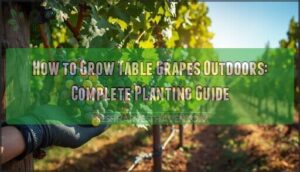This site is supported by our readers. We may earn a commission, at no cost to you, if you purchase through links.
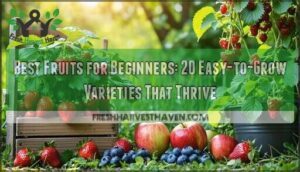
These three are practically foolproof – strawberries thrive in containers with just 10 hours of sunlight, apples adapt to diverse climates (especially dwarf varieties), and blueberries produce for decades once established.
Raspberries and blackberries are also beginner-friendly, growing quickly and requiring minimal fuss.
For small spaces, try dwarf apple trees or container-grown figs.
The secret isn’t having a green thumb – it’s choosing varieties that actually want to succeed in your specific growing conditions, which is the key to success, and helps beginners have a successful experience.
Table Of Contents
- Key Takeaways
- Easiest Fruits to Grow at Home
- Best Fruits for Small Spaces
- Low-Maintenance Fruits for Beginners
- Nutritional Benefits of Beginner Fruits
- Easy Ways to Enjoy Homegrown Fruits
- Frequently Asked Questions (FAQs)
- What fruits are easy to grow?
- Which fruit is best for a first time gardener?
- What can I eat with easy to grow fruits?
- Are all fruits beginner-friendly?
- Can you grow fruit at home?
- What fruits can you grow in a small space?
- Which is the best fruit for beginners?
- What’s the best starter fruit in blox fruits?
- What’s the best fruit to start your day with?
- What fruits ripen after being picked?
- Conclusion
Key Takeaways
- You’ll succeed with foolproof fruits like strawberries, apples, and blueberries that thrive with minimal experience and adapt to various growing conditions
- You can grow fruit in any space – strawberries work in containers, dwarf apple trees fit patios, and blueberries produce for decades in pots
- You’ll get quick rewards from low-maintenance options like blackberries and ground cherries that require basic care but deliver reliable harvests within 2-3 years
- You’ll boost your health while gardening since these beginner fruits pack serious nutrition – apples provide heart-healthy fiber, berries deliver antioxidants, and homegrown produce beats store-bought quality
Easiest Fruits to Grow at Home
You’ll be amazed at how simple it’s to grow your own fruit at home, even if you’re a complete beginner.
These seven varieties require minimal experience and offer reliable harvests that’ll have you picking fresh fruit from your yard within just a few years, providing a reliable way to enjoy fresh produce.
Apples
Apples offer unmatched versatility for beginner gardeners, thriving across diverse climates with proper care.
You’ll need two different apple varieties for successful pollination, but the reward spans decades of homegrown fruit.
- Choose dwarf varieties – perfect for small spaces, reaching only 7-10 feet tall
- Plant in full sunlight – promotes healthy growth and abundant harvests
- Prune annually – maintains tree shape and maximizes fruit production
- Plan for cross-pollination – two different varieties guarantee better yields
Strawberries
Why settle for store-bought when you can grow nature’s candy in your backyard?
Strawberries are beginner friendly fruits that thrive in containers, hanging baskets, or garden beds.
These easy to grow fruits need just ten hours of sunlight daily and well-draining soil.
Your strawberry care routine is simple: regular watering and annual replanting.
Harvest tips include picking ripe berries early morning for best flavor.
Blueberries
Blueberries pack serious nutrition benefits while being surprisingly beginner friendly fruits.
These powerhouse berries prefer acidic soil and sunny spots but forgive most growing mistakes.
Their pest control needs stay minimal compared to other fruits.
Here’s your blueberry care roadmap:
- Soil Requirements: Test pH levels between 4.5-5.5 for ideal growth
- Harvest Timing: Wait for deep blue color before picking ripe berries
- Watering: Maintain consistent moisture without waterlogging roots
- Mulching: Apply organic mulch to retain soil acidity and moisture
You’ll wait three years for full production, but established bushes reward you with decades of antioxidant-rich harvests.
Raspberries
When you’re growing beginner friendly fruits, raspberries deliver sweet success with minimal fuss.
These easy to grow fruits produce summer harvest bounty while requiring basic raspberry care—just well-draining soil and sunny spots.
Unlike other fruit gardening for beginners options, raspberries grow quickly and tolerate cold weather beautifully.
You’ll need pruning tips twice yearly, but they’re naturally resistant to most fruit pests, making home gardening simple and rewarding for newcomers with minimal fuss.
Blackberries
Blackberries offer robust, high-yielding harvests that’ll make your neighbors jealous.
These hardy perennials thrive in various soil types and start producing fruit just two years after planting. Thornless varieties eliminate the ouch factor while maintaining excellent flavor for your blackberry recipes.
Here’s what makes blackberries perfect for beginner friendly fruits:
- Cold-resistant strains handle harsh winters without fuss
- Minimal soil requirements – they’re not picky eaters
- High yields mean abundant fruit for fresh eating and preserves
- Thornless varieties offer safe harvesting for families
- Arching canes create natural trellising opportunities
These easy to grow fruits require basic pruning to control their enthusiastic growth, but that’s half the fun of fruit gardening for beginners. They offer a great way to enjoy fresh eating and preserves with minimal effort.
Gooseberries
Gooseberries thrive in most soil types and are perfect for cooler climates, making them ideal beginner friendly fruits.
These hardy shrubs start producing fruit within 1-3 years and require minimal Gooseberry Care. They’re excellent low maintenance fruits that tolerate various conditions while delivering nutritious berries perfect for Fruit Recipes.
| Growing Aspect | Details |
|---|---|
| Soil Requirements | Most soil types, well-draining preferred |
| Climate Tolerance | Cooler climates, frost-resistant |
| Fruit Production | Begins 1-3 years after planting |
| Harvest Time | Mid to late summer |
| Garden Tips | Minimal pruning, space 3-4 feet apart |
Currants
Think of currants as the overachievers of beginner friendly fruits – these compact powerhouses deliver impressive fruit harvest in remarkably tight spaces.
Black, white, and red currant varieties thrive with minimal fuss, making them perfect easy to grow fruits for new gardeners.
You’ll appreciate their versatility in currant recipes, from jams to savory sauces.
Growing currants at home requires basic growing tips: plant in well-draining soil and enjoy years of reliable production, plus excellent currant nutrition benefits.
Best Fruits for Small Spaces
You don’t need acres of land to grow delicious fruit at home.
These compact options fit perfectly in small yards, patios, or even windowsills while delivering impressive harvests that’ll make your neighbors wonder how you do it.
Dwarf Apple Trees
Dwarf apple trees pack full-sized flavor into compact forms perfect for patios and small yards.
These beginner friendly fruits reach just 6-8 feet tall, making apple pruning and tree care manageable for new gardeners.
You’ll get fruit production within 2-3 years, yielding 30-50 apples annually. Most dwarf varieties need cross-pollination methods, so plant two different cultivars for best results.
Their shallow roots require consistent watering, but these low maintenance fruits reward you with easier harvesting than towering standard fruit trees.
For ideal growth, understanding dwarf tree care is essential to maximize fruit production and tree health.
Strawberries in Pots and Baskets
You can’t beat strawberries for container gardening success.
These beginner friendly fruits thrive in hanging baskets or pots with quality potting mix.
Space saving vertical gardening becomes effortless when strawberries cascade over basket designs.
They’ll spread via runners, creating natural fruit growing tips as they multiply.
With proper strawberry care and ten hours of daily sunlight, your easy to grow fruits will reward you with sweet harvests.
They are perfect for container gardening.
Blueberries in Containers
Container-grown blueberries make perfect small-space companions.
You’ll need containers at least 16 inches wide with drainage holes and acidic soil mix containing peat and pine bark.
These beginner-friendly fruits produce 2-13 pounds annually in pots, starting within two years.
Container gardening offers winter protection and easy relocation for maximum sunlight, making blueberry care straightforward for any space.
When selecting containers, consider the importance of proper blueberry containers to promote healthy plant growth.
Currants and Gooseberries in Tight Spots
Both currants and gooseberries excel in Urban Gardening scenarios where every square foot matters.
These Compact Varieties require minimal Soil Requirements—just well-draining earth—making them perfect Space Saving solutions.
You’ll appreciate their low-maintenance nature since Fruit Pruning stays simple with annual trimming.
Black, red, and white currants thrive in tight corners, while gooseberries adapt to various conditions.
These beginnerfriendly fruits deliver consistent harvests from easytogrow plants ideal for fruit cultivation in cramped spaces.
For successful growth, understanding small space gardening techniques is essential.
Fig Trees for Patio Growing
Fig trees transform patios into Mediterranean escapes, thriving in containers with proper Fig Care. These low-maintenance fruits adapt beautifully to Patio Gardening, making Container Gardening simple for beginners in Warm Climates.
- Choose containers 18+ inches wide with drainage holes for healthy root development
- Position in sunny spots receiving 6-8 hours of direct sunlight daily
- Water consistently but avoid soggy soil – figs hate wet feet
- Expect Fruit Harvesting within 1-2 years of Patio Planting, which is a key benefit of Container Gardening.
Low-Maintenance Fruits for Beginners
If you’re new to growing fruit and want options that practically take care of themselves, these low-maintenance varieties are perfect starters.
Cherry trees, honeyberries, blackberries, and ground cherries require minimal fussing while delivering reliable harvests that’ll make your neighbors wonder how you became such a green thumb overnight.
Cherry Trees
Cherry trees stand out among beginner friendly fruits for their remarkably low maintenance requirements.
You’ll appreciate that these fruit trees need minimal pruning compared to other varieties, making them perfect for newcomers.
Sweet cherry varieties require two trees for cherry pollination, while sour cherries self-pollinate.
Both types thrive in well-draining soil requirements with full sunlight.
Your fruit harvest typically begins within a few years, and these low maintenance fruits face fewer pest problems than most tree pruning-intensive options.
They are ideal for those looking for a hassle-free experience with full sunlight.
Honeyberries
Honeyberry care couldn’t be simpler for beginner gardeners seeking low maintenance fruits. These hardy bushes thrive in extreme cold and deliver exceptional fruit nutrition with four times more vitamin C than blueberries.
- Plant two varieties for proper pollination needs
- Space bushes 3-5 feet apart for maximum berry harvest
- Provide regular water when young, drought-tolerant once established
- Expect minimal pruning requirements in first three years
- Protect ripening berries from birds with netting
These beginner friendly fruits start producing in 2-3 years and continue for decades. For healthy growth, consider the honeyberry soil requirements to guarantee a healthy harvest.
Blackberries (Thornless Varieties)
Thornless blackberries offer the perfect solution for beginners wanting robust, high-yielding fruit without the hassle of thorns.
These hardy plants adapt to various soil types and climates, making blackberry care surprisingly simple.
You’ll start harvesting sweet berries just two years after planting.
Thornless varieties require minimal pruning and produce abundant fruit perfect for fresh eating or blackberry recipes.
Their beginner-friendly nature makes them ideal low-maintenance fruits for any garden.
Ground Cherries
Looking for something even easier than thornless blackberries? Ground cherries are your golden ticket to effortless fruit gardening for beginners.
These annual plants produce small, golden-orange fruits with a unique pineapple flavor that’ll surprise your taste buds. You’ll love how these easy-to-grow fruits practically grow themselves with minimal soil requirements and simple garden placement in sunny spots.
Nature’s sweetest treasures grow with zero green thumb required – just sunshine and soil.
For ideal results, consider the indoor growing conditions that support healthy fruit development.
Nutritional Benefits of Beginner Fruits
You’ll also enjoy delicious homegrown fruits and boost your health with every bite. These beginner-friendly fruits pack impressive nutritional benefits that support your heart, immune system, and overall well-being.
Apples for Fiber and Heart Health
Your homegrown apples pack a nutritional punch that’s hard to beat.
These crisp beauties contain both soluble and insoluble fiber, supporting your digestive system while promoting heart health.
Regular apple consumption has been linked to reduced heart disease risk, making them perfect for healthy snacking.
With their excellent shelf stability and minimal prep requirements, apples represent one of the best fruits to eat for consistent nutrition and convenience in your daily routine.
Bananas for Potassium and Gut Health
A medium banana packs 422 milligrams of potassium, supporting your heart and muscle function.
This nutritious fruit offers resistant starch that feeds beneficial gut bacteria, improving digestion and reducing bloating.
Unlike many fruits with higher fruit allergy potential, bananas are gentle on sensitive stomachs.
They’re among the best fruits to eat for digestive aid and gut health benefits. Bananas provide excellent gut health benefits due to their nutrient-rich profile, which supports your overall well-being with resistant starch and potassium.
Oranges for Vitamin C
Oranges pack a serious vitamin C punch that’ll make your immune system thank you.
One medium orange delivers 82.7 mg of this health booster—nearly your entire daily intake requirement. These nutritious fruits are perfect for beginner fruit gardens.
Orange Varieties and Their Vitamin Benefits:
- Navel oranges – Sweet, seedless, and loaded with 70-90 mg vitamin C per fruit
- Valencia oranges – Ideal for juice production with consistent vitamin content year-round
- Blood oranges – Unique antioxidants plus traditional vitamin C benefits for double protection
Grapes for Antioxidants
Grapes pack a powerful antioxidant punch that makes your healthy harvest even more rewarding.
These low-glycemic fruits contain polyphenols, natural compounds that help manage blood sugar while delivering impressive antioxidant protection.
Whether you’re growing red, green, or purple grape varieties, you’ll enjoy fruit nutrition facts that support heart health and combat cellular damage through their antioxidant-rich profile.
Understanding the benefits of easy fruit gardening can help beginners make informed decisions about their homegrown fruit choices, utilizing easy fruit gardening techniques.
Berries for Vitamins and Polyphenols
Berries pack serious nutritional punch that’ll make your garden investment worthwhile.
Your homegrown berry harvest delivers nutritional power that transforms your garden into a health-boosting investment
Strawberries deliver 59mg vitamin C per 100g, while blueberries contain up to 400mg polyphenols.
These antioxidant benefits help fight inflammation and support heart health.
Blackberries and raspberries offer anthocyanins for brain protection, making berry nutrition a smart choice for vitamin sources in your backyard.
Easy Ways to Enjoy Homegrown Fruits
Once you’ve successfully grown your own fruits, you’ll discover countless delicious ways to turn your harvest into memorable meals and treats.
From simple fresh snacking to creative preservation methods, homegrown fruits can transform your kitchen adventures and provide year-round enjoyment.
Fresh Snacking and Salads
Nothing beats the satisfaction of picking sun-warmed strawberries straight from your garden for an instant healthy snack.
Your homegrown treasures make perfect Fresh Picks that’ll have you reaching for nature’s candy instead of processed alternatives.
- Fruit Platters – Arrange colorful berries, apple slices, and grapes for impressive presentations
- Basic Fruit Salad – Mix strawberries, blueberries, and raspberries with mint for invigorating Healthy Bites
- Simple Fruit Recipes – Toss berries into green salads for natural sweetness
- Snack Options – Keep washed grapes and apple wedges ready for grab-and-go moments
Baking and Preserves
When your harvest overflows, baking and preserves become your best friends.
Sour cherries shine in classic pie making, while strawberries transform into vibrant fruit jam with minimal sugar preserves techniques.
Simple fruit recipes like apple crisp require basic baking tips—just toss fruit with sugar and oats.
Blueberry muffins showcase your berries beautifully.
Master jam making by combining equal parts fruit and sugar, then store properly for year-round enjoyment.
To achieve the best results, understanding proper food storage methods is vital for maintaining freshness and flavor.
Smoothies and Breakfast Ideas
Your homegrown treasures work perfectly in Morning Shakes and Breakfast Bowls.
These Quick Recipes turn your easy-to-grow fruits into Healthy Starters that’ll kickstart any day.
- Berry Breakfast Bowls: Layer fresh strawberries, blueberries, and raspberries over yogurt for antioxidant-packed beginner-friendly fruits
- Apple Cinnamon Smoothies: Blend sweet apples with oats for fiber-rich smoothies
- Mixed Fruit Blends: Combine different breakfast varieties for complex fruit flavors
Freezing and Storing Harvests
After harvesting your homegrown bounty, proper freezing and storing methods will preserve your fruit’s quality for months.
Flash freezing on parchment-lined trays prevents clumping, while dry-packed berries maintain texture best.
Using the right freezer storage containers is essential for maintaining the quality of frozen fruits.
| Freezer Methods | Storage Tips | Harvest Timing |
|---|---|---|
| Flash freeze sliced fruit on trays | Use moisture-proof containers | Pick ripe but firm produce |
| Dry pack whole berries | Remove air from freezer bags | Freeze immediately after harvest |
| Sugar pack stone fruits | Label with date and type | Avoid overripe specimens |
Cold storage extends freshness substantially—apples keep five months in root cellars, while citrus fruits last weeks refrigerated in sealed bags.
Pairing With Other Beginner-Friendly Foods
Your beginner-friendly fruits shine when paired with other easy foods.
Think yogurt parfaits with fresh strawberries, apple slices with peanut butter, or homemade fruit salads mixing berries and grapes.
- Greek yogurt bowls – Top with blueberries and raspberries for healthy snacks
- Oatmeal combinations – Add diced apples or blackberries for breakfast ideas
- Cheese platters – Pair grapes with mild cheeses for balanced meal planning
- Smoothie bases – Blend any easy-to-grow fruits with bananas for fresh eating
These food pairing ideas maximize your harvest’s culinary uses while keeping preparation simple.
Frequently Asked Questions (FAQs)
What fruits are easy to grow?
Picture yourself as a fruit tree whisperer – some plants practically beg you to succeed while others demand a PhD in botany.
You’ll love strawberries, blackberries, and blueberries since they’re practically foolproof, requiring minimal space and care while delivering sweet rewards within just a few years of planting.
Which fruit is best for a first time gardener?
Strawberries are your best bet for first-time gardening. They’re incredibly forgiving, grow in containers or small spaces, require minimal care, and you’ll see fruit within months rather than years.
What can I eat with easy to grow fruits?
You’ll create delicious meals with your homegrown strawberries, blackberries, and apples.
Fresh berry smoothies, homemade jams, apple pies, and fruit salads become staples.
These beginner-friendly fruits transform into endless snacks and delicious desserts.
Are all fruits beginner-friendly?
Not all fruits are beginner-friendly, though some shine brighter than others.
While apples, bananas, and strawberries offer easy growing conditions and minimal care, exotic fruits like pineapples, pomegranates, and avocados demand specific climates, lengthy growth cycles, and careful pest management that can challenge new gardeners, requiring careful pest management.
Can you grow fruit at home?
You can definitely grow fruit at home!
Many fruits like strawberries, blueberries, and apples adapt well to containers or small gardens.
They’ll thrive with proper sunlight, well-draining soil, and regular care.
What fruits can you grow in a small space?
When space is tight as a drum, you can’t go wrong with strawberries in hanging baskets, dwarf apple trees, or blueberries in containers—they’ll thrive in small yards or patios.
Which is the best fruit for beginners?
Strawberries are your best bet for getting started. They’re practically foolproof, grow in containers or small beds, need minimal care, and you’ll see fruit within the first year of planting.
What’s the best starter fruit in blox fruits?
Unlike fresh strawberries versus frozen options, Blox Fruits offers unique powers.
Light Fruit provides fast travel speed and strong attacks, making early leveling much easier, while Buddha Fruit increases your size and provides excellent defense for beginners.
What’s the best fruit to start your day with?
Bananas are your morning champion. They’re packed with potassium and natural sugars that kickstart your energy without the crash. Plus, they’re nature’s perfect grab-and-go package—no prep required!
What fruits ripen after being picked?
Many fruits continue ripening after you pick them, including bananas, avocados, pears, peaches, plums, and tomatoes. They’ll soften and sweeten on your counter through natural ethylene gas production.
Conclusion
Starting a fruit garden doesn’t have to be rocket science when you choose the best fruits for beginners.
These twenty varieties prove that anyone can cultivate delicious, homegrown produce with minimal experience.
From strawberries that’ll reward you within months to apple trees that’ll feed your family for generations, success comes down to matching plants with your space and climate.
You’ve got container options for apartments, low-maintenance choices for busy schedules, and nutritious varieties that’ll boost your health.
Start small, stay consistent, and you’ll be amazed at what you can grow, and remember that homegrown produce is a key part of a healthy lifestyle.
- https://www.bbcgoodfood.com/health/nutrition/top-20-healthiest-fruits
- https://www.healthline.com/nutrition/healthy-fruit
- https://www.health.com/healthiest-fruits-8606077
- https://www.heart.org/en/healthy-living/healthy-eating/add-color/how-to-eat-more-fruits-and-vegetables
- https://www.cdc.gov/nchs/products/databriefs/db391.htm

